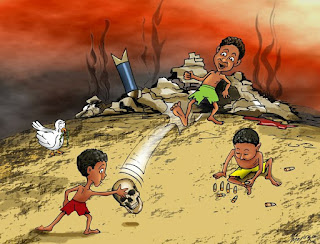Here is a survivor of
complex post-traumatic stress disorder - Pete Walker, the one who got complex PTSD
and eventually recovered. He was survived childhood in a war zone of a dysfunctional
family in New York City. He had escaped from his family and went to Vietnam era
army.
By the time he was 25, he has found out he was seriously hurting after he had survived from the high risk activity peppered with what actually looked like unconscious suicide attempts. After that, he was spent few decades to explore varied spiritual and psychological approaches in order to heal his trauma and he has shared the unique perspective and tools with his fellow complex-PTSD and PTSD sufferers. Other than that, he has published a book that is about the complex-PTSD as a guide and map for recovering from the trauma.
We can know from the online article of Pete Walker and above of our blog, the genesis of complex-PTSD mostly associated with long periods of ongoing sexual and/or physical abuse in the childhood. The extremes of verbal and emotional abuse also a factor of complex-PTSD. Not only that, the long-term emotional neglect can cause complex-PTSD and more likely to emotional flashback. In present time, the parents of a dysfunctional families disdain their children for needing attention from them and react contemptuously to baby. It can also cause complex-PTSD to the children.
 |
| Credit by Cartoon Movement |
By the time he was 25, he has found out he was seriously hurting after he had survived from the high risk activity peppered with what actually looked like unconscious suicide attempts. After that, he was spent few decades to explore varied spiritual and psychological approaches in order to heal his trauma and he has shared the unique perspective and tools with his fellow complex-PTSD and PTSD sufferers. Other than that, he has published a book that is about the complex-PTSD as a guide and map for recovering from the trauma.
 |
| Pete Walker. Credit by pete-walker.com |
We can know from the online article of Pete Walker and above of our blog, the genesis of complex-PTSD mostly associated with long periods of ongoing sexual and/or physical abuse in the childhood. The extremes of verbal and emotional abuse also a factor of complex-PTSD. Not only that, the long-term emotional neglect can cause complex-PTSD and more likely to emotional flashback. In present time, the parents of a dysfunctional families disdain their children for needing attention from them and react contemptuously to baby. It can also cause complex-PTSD to the children.
The emotional flashback
of patient can be activated by triggers. Triggers can be internal and external.
External triggers are people, things, places, events, facial expression, styles
of communication and many more. Here are some example of external triggers:
revisiting the place, hearing
someone use a parent’s shaming turn of phrase and encounter someone
resembles the abuser. The internal triggers can be involved thought and visualization
about endangerment for example: visualizing someone being abusive. With the
path of recovering, patient can become more cognizant of their triggers, and
work quicker to work through incidents of being triggered into a flashback.
The toughest part in the path of recovering is the patients will keep
feeling blaming and shaming on themselves every time they have a flashback. It is
a thinking of all-or-none, the recurrence of fear, depression and feeling shame
is interpreted as meant that nothing changed even they have been a while not
over-activated. It is very hard for them to overcome and recover from an
overwhelmingly painful experience.
Since there is no prevention for complex
post-traumatic stress disorder and the symptoms will give the victims a very
long-term torture even through their whole life. Therefore, we should have to
avoid ourselves to be one of the instigator of the domestic violence, bully
event, sexually abuse and et cetera. We have to heed our behavior and verbal
toward others to prevent discrimination and hostility. If you know someone who
around you has complex-PTSD would you like to offer your help and show them
your kindness? Give them a little hope? If yes, how would you do and what
should you do? If you giving them help in a wrong way it will just make it
worse. Here is some tips for you about what to do to let the patient of
complex-PTSD feel the warmness of humanity:
- give them support, a shoulder to cry on
- offer sympathy
-lend them an ear
- give them support, a shoulder to cry on
- offer sympathy
-lend them an ear
Be patient and put your attention on them
when they tell because they always feel insecure when they surround with people.
Therefore, when they try to communicate with you, please take a minute to
listen and understand them. Never push your own agenda and tell them just get
over it because you do not ever know how tough they have been gone through and
how many effort they have put.
Your little help, little love and a little
time can make their life DIFFERENCE.
References:
Thowfeek, T. & Thowfeek, T. (2015). Complex
Post Traumatic Stress Disorder (C-PTSD). Out of the FOG. Retrieved
29 September 2016, from http://outofthefog.website/toolbox-1/2015/11/17/complex-post-traumatic-stress-disorder-c-ptsd
Pete. W. (n.d). COMPLEX-PTSD ARTICLES. Pete Walker. Retrieved 11 October 2016, from http://pete-walker.com/index.htm


No comments:
Post a Comment